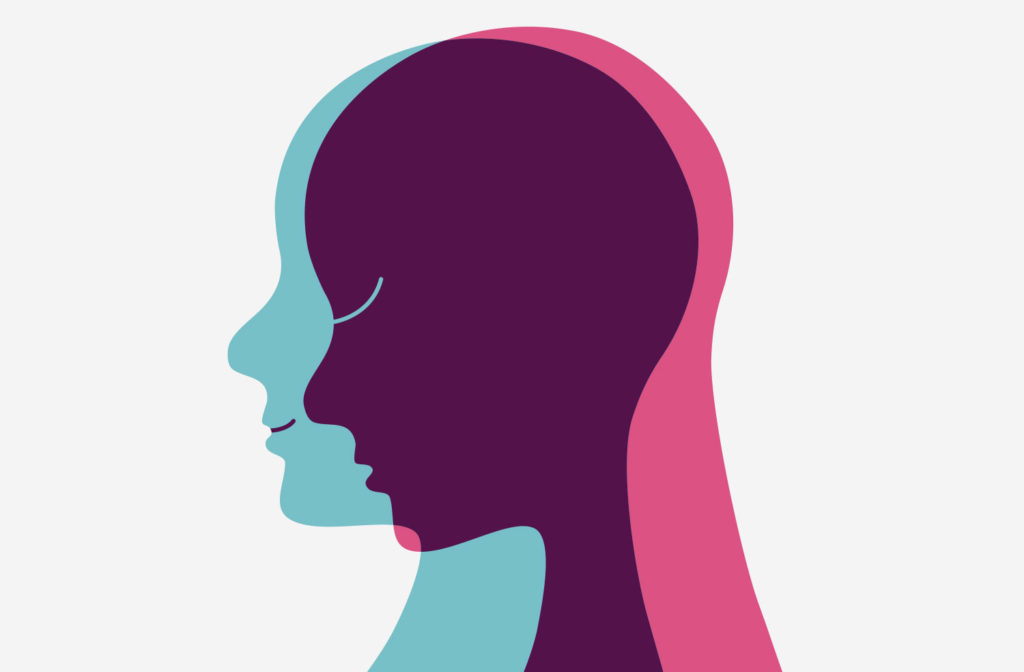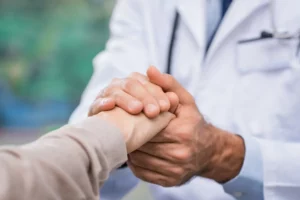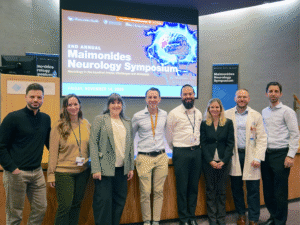Summary
Those who identify as gender/sexual minorities are more likely to struggle with their mental health. Dr. Laurel Wright explores the correlation between the LGBQTA+ community and mental health as well as provides resources for those in need.
Listen on Spotify Listen on Apple Podcasts
Transcript
Prakash Chandran (Host): This MaimoMed Talk COVID-19 podcast was recorded on October 20th, 2021. COVID-19 has had as severe impact on many in the LGBTQ+ community. Housing instability and economic stresses have piled on top of the mental cost of physical distancing. If you’re struggling with mental health during this pandemic, near or far, a strong network of support is critical. Here to tell us more about mental health and COVID for the LGBTQ+ community is Dr. Laurel Wright, Staff Psychologist Adult Outpatient Services, and Co-Director of the Psychology Externship Program for Maimonides. This is MaimoMed Talk. I’m your host Prakash Chandran. So, Dr. Wright really great to have you here today. I was hoping that you could just start by briefly telling us a little bit about yourself and what you do at Maimonides.
Laurel Wright, PhD, MPH (Guest): Absolutely. Thank you so much for having me. I’m a Clinical Psychologist by training and I work with individuals across the lifespan. So, children, adolescents, and adults. I also run group psychotherapy. I provide individual supervision for psychiatry residents and psychology trainees on the inpatient unit and for outpatient services.
Host: Okay. And tell us a little bit about what your day-to-day is like.
Dr. Wright: Most of my time is spent seeing individual patients, whether that be in-person or through Telehealth services, Maimonides Virtual Care, specifically. I also meet with individual trainees who are providing their own services, seeing patients to discuss their cases, to think about case conceptualizations, how to provide the most effective intervention for their care and to meet their needs.
I also do quite a lot of teaching and education. Some of the talks that I deliver have to do with LGBTQ mental health, of course, but also related to dissociation, trauma. And I also provide a lecture series on psychodynamic psychotherapy.
Host: So, today we’re talking about COVID-19 mental health as it relates to the LGBTQ+ community. And it really seems like they’ve been suffering disproportionately with mental health since COVID-19. Is this something that you have seen become more severe?
Dr. Wright: Absolutely. To your point, folks who identify as gender and sexual minorities are already a very high risk and vulnerable group when it comes to mental health issues. Things like isolation, minority stress, family, and social rejection; these have all seemed to only exacerbate with the onset of the pandemic. And we see that need for services just continues to really grow that even though things with the pandemic may be changing the subsiding to some sense that individual still needs so much mental health care and support services are just really not sufficiently available yet.
Host: Yeah, it is really a shame. And one thing that I’ve noticed is that people start reaching out to community and in many ways, community starts to take on the role of family, especially for those who may not be supported by their own family. So, with physical distancing, do you feel like there is greater risk of feeling disconnected from your support network and what have you been seeing people do to address this?
Dr. Wright: That’s a really interesting question and actually feels very relevant, especially for younger groups of LGBTQ folks. And what seems to be happening is that there are a lot of online resources that are being utilized right now. A lot of community building that’s happening in, you know, online spaces, and with social media specifically, but at the same time, the peer support is so critical. There’s such a wealth of value that comes with having peer to peer connections. People who know what you’re going through, who can relate to your experiences. And at the same time, we are really lagging in kinds of care and support that is offered at the mental health provider level, people with specialized training and education to provide those services.
Host: How do you feel like this is being changed? You know, I know that there is a lack and you know, you said that a lot of people are reaching out online. I’m just trying to figure out, what’s the best way that people can reach out and get what they need, even though there’s this lack of support, or if they’re at a distance.
Dr. Wright: Hopefully, our program will be part of the larger shift that we see in the mental health movement, so to speak. And that is the increase of specialized services that are available for folks who identify as LGBTQ. I think one of the other major changes that we are starting to see, just by sheer population numbers, is that so many more people identify as LGBTQ now, certainly more than have ever in the past.
And what we’re starting to see is that providers like myself, folks who are members of the LGBTQ community, who are invested in providing this care, are getting the training necessary to do so. And hopefully that will, will just continue to grow. And more opportunities for training and education will be available. And that these types of specialty services, particularly ones who are offered by members of the community themselves, will continue to be available.
Host: So, when you talk about specialized care, I’d love to understand a little bit more about what that means. Like, can you talk about what’s traditionally done and in contrast, talk about what you specifically offer at Maimonides.
Dr. Wright: Absolutely. Most training programs, unfortunately, whether that be in psychiatry, psychology, social work related fields, most of them don’t have specific training and education built into their curriculum that addresses community specific issues like for LGBT folks. That is starting to change, which is fantastic. But not fast enough. So, a lot of the education that we do or my own training in particular, has really focused on how we meet specific needs of LGBTQ folks related to the kinds of social and familial experiences they have, the ways that their identities intersect with their mental health needs and risks, and try to make that knowledge available to more providers.
In our training settings, at our inpatient clinics, our outpatient services across all different types of departments in our healthcare system, we provide individual psychotherapy, therapy. We also do a psychiatric medication management. We also offer family and couples work treatment as well as group psychotherapy.
So, we have a wide range of services that people can engage with as they meet their needs. And we are also excited to learn more about what our community needs and be able to respond to those with new and different services in the future.
Host: You know, one of the things that I wanted to talk to you about is I personally may not be in the LGBTQ+ community, but I want to be as supportive as possible. And you know, without the experience and understanding myself, I was hoping that you could advise listeners that want to be supportive the best way to do so.
Dr. Wright: This is a great question because allyship is so important, right? So, not everybody does identify as LGBTQ. And at the same time, there are ways that our social and cultural norms have really been grounded in cisgender heteronormativity. Right? So, folks who aren’t members of the LGBTQ community may be less inclined to think about things like disclosing their pronouns or asking people about what pronouns they use or thinking about how a person’s intersectional identity affects their experience.
So, you know, I think that there are a lot of resources available for allies, for people who support the LGBTQ community and ways that they can be more proactive by asking more questions about how to support individual people that they may work with or provide the kind of advocacy that LGBTQ folks are mostly burdened with to perform themselves.
These are, you know, even sometimes small conversations or you know, small mentions, and notice of awareness can really make a difference.
Host: Okay. That is very helpful. And you know, speaking of allyship, do you have any resources that we can go to, to learn more?
Dr. Wright: There’s a couple of places that I’m thinking of. For instance, The Trevor Project is a really fantastic resource for youth services in particular. And thinking about the LGBTQ mental health lens from a young person’s perspective, that’s a really great place to start. There are also a lot of great services, certainly in our New York area.
So The Center or even places like Housing Works, provide a lot of care. Callen Lorde you know, these are sort of homegrown community based resources and organizations that can be very valuable. But we also know that, you know, places like PFLAG, which are geared towards parents and caregivers can also be very useful.
And also thinking about what resources exist in your institutions specifically, what are your internal resources, whether that’s you know, people specific or institutional knowledge that can also be very valuable.
Host: Yeah, thank you so much for that. And I’d love to just hear from you, what are some of the most common things or common themes that you’re seeing as you’re in these conversations every single day? You know, we’re kind of in this unprecedented time during this pandemic but what are some things that you can surface to let people know that are listening, that they might not be alone?
Dr. Wright: Well, I think as we spoke to earlier you know, the rates of depression and anxiety, substance use are quite marked, particularly among folks who identify as LGBT. And again, there are a lot of different kind of social and cultural factors that may contribute to that.
There are also individual experiences as well as you know, peer and social group factors, right. But I think it’s also important to know that a lot of these experiences have so much to do with isolation from peer groups, from family due to your identity, in particular, can often be so detrimental to a person’s mental health and wellbeing. But, you know, I think that’s why again, so many of these online communities and with social media, that there’s just wealth of sharing that’s taking place in ways that we haven’t always been able to do. So, there’s a lot of resilience, of course, and there’s a lot of effort to overcome these kinds of challenges and obstacles even amidst all of the barriers.
Host: So, you know, what’s one service or resource at Maimonides that you wish more people in the LGBTQ+ community took advantage of and how might they be able to access it?
Dr. Wright: Well, we are working really hard to build up our own LGBTQ sub-specialty mental health clinic here, where we have a dedicated team of providers, very interdisciplinary. We work with psychiatrists, social workers, psychologists, to bring together the most I think, in-depth comprehensive services that are available.
So we hope to launch a website fairly shortly to get out the word and be more visible to members of the community. But I think it’s really key to know that folks who want to receive services here who identify as LGBTQ can be paired with providers who have specialized training, many of them who identify as LGBTQ themselves to receive their services, right? Because the lack of provider knowledge and the stigma that’s often attached with being LGBTQ can be a tremendous barrier for people. And we are working really hard to deconstruct that.
Host: Yeah, that sounds amazing. So, just as we start to close here, is there any other advice that you’d like to give or any sentiments that you’d like to share to those that are listening?
Dr. Wright: Well, I guess if we go back to one of the points that you made earlier, you are not alone and people who are dedicated to being available to help you and support you. And you know, I think that’s one thing that’s really great about our clinic and our program is that we work very hard to make our services affordable and accessible and our goal is really to be the most comprehensive, but also involved care providers as possible.
And I think that’s really important is that we are here to be of service and use. And you know, our goal was only to keep growing.
Host: Dr. Wright. I really appreciate your time today. Thank you so much.
Dr. Wright: Thank you so much for having me. I appreciate it.
Thank you so much for having me. I appreciate it.
Host: To learn more about this topic and to check out all of our other podcasts for more topics that might be of interest to you, you can visit maimo.org. And that is spelled M-A-I-M-O.org. This has been MaimoMed Talk. I’m your host Prakash Chandran. Stay well.







